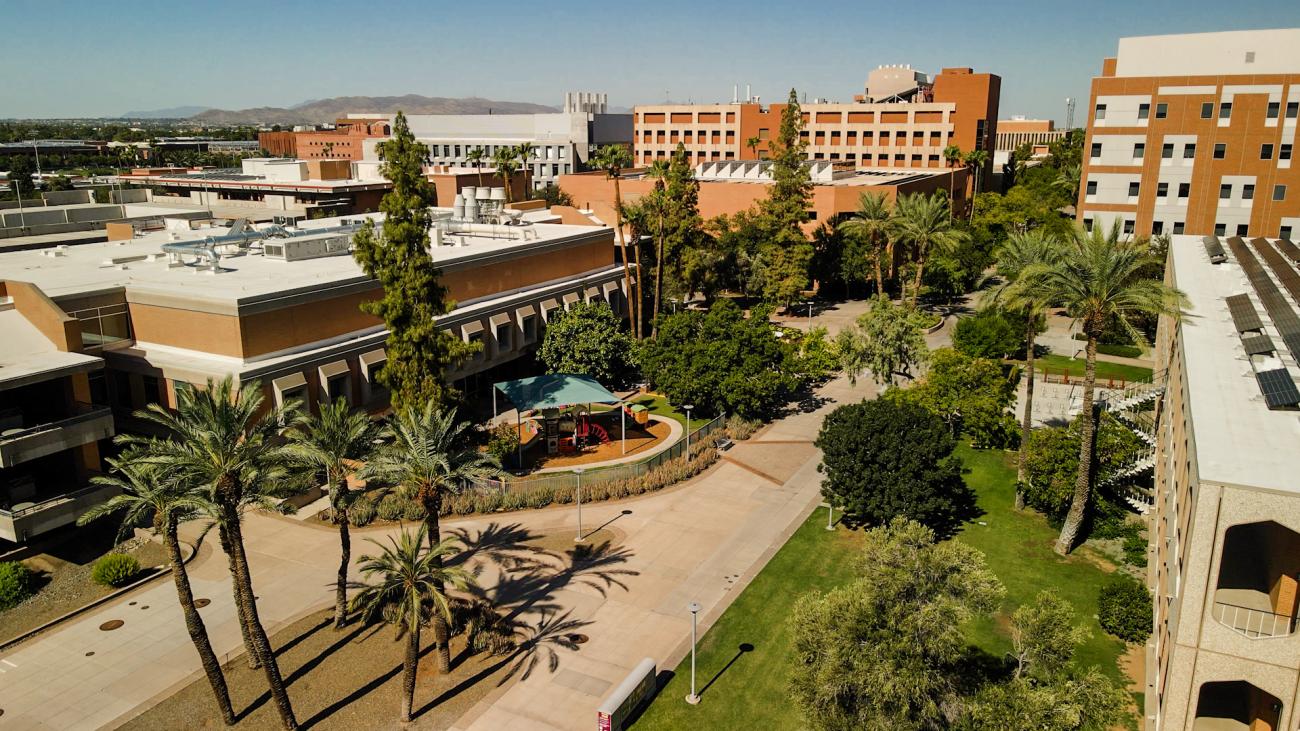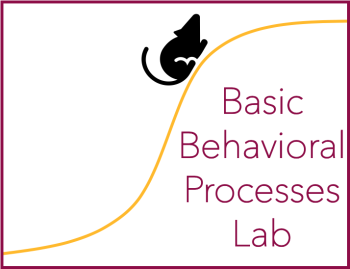
Basic Behavioral Processes Lab (Sanabria)

Our lab uses detailed analyses of animal behavior to investigate basic behavioral and cognitive processes and their implication in behavioral dysregulation. Common focuses of this research include timing, learning, decision-making, and impulsivity. The BBP lab relies on the collection of high-resolution operant behavioral data, the development of mathematical models of learning and behavior, and on the design of novel behavioral paradigms for use in animal models.
Current Projects:
Collective learning. This project aims to identify fundamental processes of collective learning, using rats as animal model. In a series of associative-learning experiments, we test which form of training—individual or collective— results in faster and more durable learning that is resilient to interference from uninformative cues. In another set of experiments, we examine how pairs of animals use complementary skills to solve complex problems. Findings from these experiments will aid in determining the factors that can promote or impede collective intelligence when humans or machines (e.g., artificial intelligence) perform tasks as a group.
Alcohol-seeking behavior. This project has two components, both implemented in mice. The first one is to determine whether the maintenance, extinction, and reinstatement of alcohol-seeking behavior in mice is organized as bouts of activity. A critical part of this aim is to establish the extent to which the rate of initiation and length of bouts are selectively sensitive to key manipulations. A second goal is to study the sensitivity of alcohol-seeking behavior to economic variables such as unit price and availability of economic substitutes. Findings from this project will inform strategies to detect the efficacy of treatments to reduce alcohol seeking and craving.
Principal Investigator & Lab Director
Prof. Federico Sanabria, Ph.D.; Associate Professor (CV)
Prof. Sanabria’s research is focused on the development of computational models of basic behavioral and cognitive processes, including learning (collective and individual), interval timing, choice, and response inhibition. His work is conducted primarily through experimental research in animal models. He is the Director of Diversity, Equity, Inclusion and Belonging at the Department of Psychology at ASU. Prof. Sanabria was Associate Editor of the Journal of the Experimental Analysis of Behavior and of Learning & Behavior. He also serves as Program Chair and President-Elect of the Society for the Quantitative Analysis of Behavior (SQAB), in the Executive Boards of SEAB and APA Division 25, in the Editorial Board of the Journal of Experimental Psychology: Animal Learning and Cognition; Journal of Neuroscience, Psychology, and Economics; Behavioral Neuroscience; among others. He has published over 70 empirical and theoretical papers and chapters on basic behavioral processes, as well as the entry on Pavlovian and instrumental conditioning for the Oxford Research Encyclopedia of Psychology and a textbook on learning and conditioning. Prof. Sanabria’s research has been funded by NIH and NSF.
Postdoctoral Researcher
Cristina Santos, Ph.D. ASU profile, Google scholar, ResearchGate, CV
Dr. Santos’s research focuses on the mechanisms of associative learning and time perception that determine choice. Aiming to build a parsimonious and plausible account of learning in dynamic environments, she compares the predictions of computational models of behavior with data obtained from animal experiments in a variety of behavioral tasks. She leads the Collective Learning project as a senior researcher responsible for data integrity and computational modelling and coordinating a team of undergraduate research assistants and graduate students.
Doctoral Students
Undergraduate and Post-Baccalaureate Students
Carter Bower, Thorunn McLaughlin
Alumni
Past Ph.D. Students
Dr. Tanya Gupta (2022) (Google Scholar)
Dr. Carter Daniels (2018)
Dr. Ryan Brackney (2015)
Dr. Elizabeth Watterson (2015)
Dr. Gabriel Mazur (2014)
Past Visiting Scholars
- Cristina Santos (Universidade de Aveiro, Portugal)
- Angel Jimenez Ortiz (Universidad de Guadalajara, Mexico)
- Javier Ibias (Universidad Nacional de Educación a Distancia, Spain)
- Beatriz Robayo (Universidad de Guadalajara, Mexico)
- Pablo Covarrubias (Universidad de Guadalajara, Mexico)
- Felipe Cabrera (Universidad de Guadalajara, Mexico)
Research Opportunities
For undergraduate students:
Undergraduate students at our lab are either Research Assistants (RAs) or Research Leaders (RLs).
Students first join our lab as RAs These are students that:
- commit to an average of 9 hours a week for at least two consecutive periods (fall, summer, or spring),
- are not required to attend our lab meetings (but can if they like to),
- are responsible for most of the data collection (handling mice and rats on a daily basis), and
- assist with cleaning and maintenance of all areas and equipment.
In our lab, RAs learn how to handle rodents, operate basic functions of behavioral testing equipment, keep lab journals, organize digital data files, and work as a team. Recommendation letters are only available after completing two consecutive collaboration periods.
Students conducting their Honors thesis with us are Research Leaders (RLs). These students are required and expected to:
- commit to an average of 12 hours a week (15 max),
- attend lab meetings on a weekly basis (1 hour),
- train and lead RAs,
- keep up to date the Lab's notebooks and records, and
- prepare weekly data reports.
Students enrolled in the ENERGIZE Research Iniciative, taking PSY 499 credit, supported by WAESO or recipients of the Jenessa Shapiro Undergraduate Research Scholarship for work in the lab, are expected to write a report of their work by the end of the semester in which they were supported and present their research.
Regardless of their role in our team, everyone is expected to be professional, follow good research practices, be courteous at all times, and foster a collaborative work environment.
If you are interested in joining our lab, tell us more about you.
For graduate students:
We are currently recruiting graduate students for Fall 2023 through the Behavioral Neuroscience and Comparative Psychology program. Please contact Dr. Sanabria at [email protected] expressing your interest and attach your CV.
Select and Recent Publications
For a full list of publications please visit Dr. Federico Sanabria’s Google scholar profile.
Berk, H. R., Gupta, T. A., & Sanabria, F. (2021). On the appropriate measure to estimate hyperbolic delay discounting rate (K) using the method of least squares. Perspectives on Behavior Science, 44, 667-682. https://doi.org/10.1007/s40614-021-00306-x
Brackney, R. J., Garcia, R., & Sanabria, F. (2021). Longer operant lever-press duration requirements induce fewer but longer response bouts in rats. Learning & Behavior, 49, 330-342. https://doi.org/10.3758/s13420-021-00464-7
Holter, M. C., Hewitt, L. T., Nishimura, K. J., Knowles, S. J., Bjorklund, G. R., Shah, S., Fry, N. R., Rees, K. P., Gupta, T. A., Daniels, C. W., Li, G., Marsh, S. Treiman, D. M., Olive, M. F., Anderson, T. R., Sanabria, F., Snider, W. D., & Newbern, J. M. (2021). Hyperactive MEK1 signaling in cortical GABAergic neurons promotes embryonic parvalbumin neuron loss and defects in behavioral inhibition. Cerebral Cortex, 31, 3064-3081. https://doi.org/10.1093/cercor/bhaa4
Sanabria, F. (2021). Pavlovian and instrumental conditioning. Oxford Research Encyclopedia of Psychology. https://doi.org/10.1093/acrefore/9780190236557.013.784
Judd, J. M., Smith, E. A., Kim, J., Shah, V., Sanabria, F., & Conrad, C. D. (2020). Chronic stress has lasting effects on improved cued discrimination early in extinction. Learning & Memory, 27, 319-327. http://www.learnmem.org/cgi/doi/10.1101/lm.051060.119
Patock-Peckham, J. A., Belton, D. A., D’Ardenne, K., Tein, J.-Y., Bauman, D. C., Infurna, F. J., Sanabria, F., Curtis, J., Morgan-Lopez, A. A., & McClure, S. M. (2020). Dimensions of childhood trauma and their direct and indirect links to PTSD, impaired control over drinking, and alcohol-related-problems. Addictive Behaviors Reports, 12, 100304. https://doi.org/10.1016/j.abrep.2020.100304
Sanabria, F. (2020). Internal-clock models and misguided views of mechanistic explanations: A reply to Eckard & Lattal (2020). Perspectives on Behavior Science, 43, 779-790. https://doi.org/10.1007/s40614-020-00268-6
Sanabria, F. & Bell, M. C. (2020). Failure to find a distance effect in pigeon choice: Manipulating amount and delay of reinforcement. Journal of the Experimental Analysis of Behavior, 114, 276-290. https://doi.org/10.1002/jeab.627
Santos, C. & Sanabria F. (2020). Past outcomes and time flexibly exert joint control over midsession reversal performance in the rat. Behavioural Processes, 171, 104028. https://doi.org/10.1016/j.beproc.2019.104028
Alfaro, L., Sanabria, F., & Cabrera, R. (2019). The role of outcome unit size in the collective foraging strategies of rats. International Journal of Comparative Psychology, 32. https://doi.org/10.46867/ijcp.2019.32.00.16
Gupta, T. A., Daniels, C. W., Ortiz, J. B., Stephens, M., Overby, P., Romero, K., Conrad, C. D., & Sanabria, F. (2019). The differential role of the dorsal hippocampus in initiating and terminating timed responses: A lesion study using the switch-timing task. Behavioural Brain Research, 376, 112184. https://doi.org/10.1016/j.bbr.2019.112184
Sanabria, F., Daniels, C. W., Gupta, T., & Santos, C. (2019). A computational formulation of the behavior systems account of the temporal organization of motivated behavior. Behavioural Processes, 169, 103952. https://doi.org/10.1016/j.beproc.2019.103952
News & more
Dr. Federico Sanabria has been awarded a grant from the Division of Behavioral and Cognitive Science of the National Science Foundation. In collaboration with the Behavioral Ecology Lab at the University of Georgia, this award will allow the research team to develop an empirical and theoretical investigation on associative learning in groups; inaugurating a new line of research: Collective Learning.
Contact Us
If you are interested in joining our lab and would like to know more about us, send an email to Matthew Gildea at [email protected]. If there is an opening available, an interview and lab tour will be arranged.